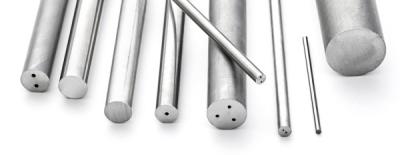
Hyperion Materials & Technologies, a leading global materials science company that develops hard and super-hard materials for a variety of industries and applications, announced today the launch of its grade AM110 tungsten carbide rod blanks that excel in machining superalloys such as INCONEL.
Hyperion’s materials experts specially engineered grade AM110 to optimize the hardness, toughness and galling resistance required for machining superalloys in today’s demanding industrial applications. Some of the targeted markets include aerospace, medical and energy, where quality and productivity are critical to manufacturing precision components.
“We are continuously working with our toolmaker customers to develop improved grades and products that help them solve their biggest challenges,” said Ron Voigt, Chief Executive Officer of Hyperion. “Machining superalloys brings a different set of challenges due to intense heat and high pressure on the tooling. Our AM110 grade of carbide rods can overcome these challenges, producing tooling that delivers more predictable results with cutting edges that break less often.”
Testing at Hyperion demonstrated that end milling tools made with grade AM110 rod blanks performed 35 percent better on INCONEL workpieces compared to conventional tungsten carbide grades.
“One of Hyperion R&D’s strengths is the ability to effectively combine our knowledge of customer applications, expertise in machining mechanics and deep expertise in materials science to develop cutting-edge carbide grades that deliver both productivity and durability,” said Biju Varghese, Hyperion’s Vice President of Engineered Solutions and Global R&D. “Our research and development team achieved the ideal composition with grade AM110 and delivered a product that provides a superior balance between wear, galling and toughness for superalloy machining.”
Hyperion offers grade AM110 carbide rods in a variety of dimensions and finishes and as sintered or ground to ISO h5 or h6 tolerances.
Contact Details
Related Glossary Terms
- galling
galling
Condition whereby excessive friction between high spots results in localized welding with subsequent spalling and further roughening of the rubbing surface(s) of one or both of two mating parts.
- gang cutting ( milling)
gang cutting ( milling)
Machining with several cutters mounted on a single arbor, generally for simultaneous cutting.
- hardness
hardness
Hardness is a measure of the resistance of a material to surface indentation or abrasion. There is no absolute scale for hardness. In order to express hardness quantitatively, each type of test has its own scale, which defines hardness. Indentation hardness obtained through static methods is measured by Brinell, Rockwell, Vickers and Knoop tests. Hardness without indentation is measured by a dynamic method, known as the Scleroscope test.
- milling
milling
Machining operation in which metal or other material is removed by applying power to a rotating cutter. In vertical milling, the cutting tool is mounted vertically on the spindle. In horizontal milling, the cutting tool is mounted horizontally, either directly on the spindle or on an arbor. Horizontal milling is further broken down into conventional milling, where the cutter rotates opposite the direction of feed, or “up” into the workpiece; and climb milling, where the cutter rotates in the direction of feed, or “down” into the workpiece. Milling operations include plane or surface milling, endmilling, facemilling, angle milling, form milling and profiling.
- superalloys
superalloys
Tough, difficult-to-machine alloys; includes Hastelloy, Inconel and Monel. Many are nickel-base metals.
- tungsten carbide ( WC)
tungsten carbide ( WC)
Intermetallic compound consisting of equal parts, by atomic weight, of tungsten and carbon. Sometimes tungsten carbide is used in reference to the cemented tungsten carbide material with cobalt added and/or with titanium carbide or tantalum carbide added. Thus, the tungsten carbide may be used to refer to pure tungsten carbide as well as co-bonded tungsten carbide, which may or may not contain added titanium carbide and/or tantalum carbide.








